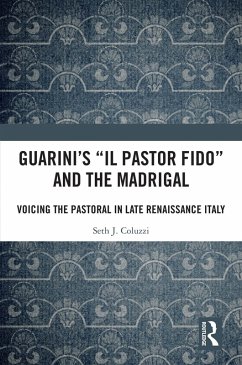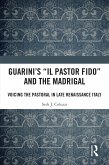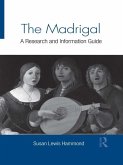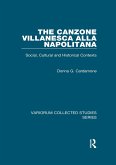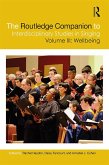Seth Coluzzi
Guarini's 'Il pastor fido' and the Madrigal (eBook, ePUB)
Voicing the Pastoral in Late Renaissance Italy
41,95 €
41,95 €
inkl. MwSt.
Sofort per Download lieferbar

21 °P sammeln
41,95 €
Als Download kaufen

41,95 €
inkl. MwSt.
Sofort per Download lieferbar

21 °P sammeln
Jetzt verschenken
Alle Infos zum eBook verschenken
41,95 €
inkl. MwSt.
Sofort per Download lieferbar
Alle Infos zum eBook verschenken

21 °P sammeln
Seth Coluzzi
Guarini's 'Il pastor fido' and the Madrigal (eBook, ePUB)
Voicing the Pastoral in Late Renaissance Italy
- Format: ePub
- Merkliste
- Auf die Merkliste
- Bewerten Bewerten
- Teilen
- Produkt teilen
- Produkterinnerung
- Produkterinnerung

Bitte loggen Sie sich zunächst in Ihr Kundenkonto ein oder registrieren Sie sich bei
bücher.de, um das eBook-Abo tolino select nutzen zu können.
Hier können Sie sich einloggen
Hier können Sie sich einloggen
Sie sind bereits eingeloggt. Klicken Sie auf 2. tolino select Abo, um fortzufahren.

Bitte loggen Sie sich zunächst in Ihr Kundenkonto ein oder registrieren Sie sich bei bücher.de, um das eBook-Abo tolino select nutzen zu können.
This book explores what happens when a lover's lament is transplanted from the theatrical stage to the courtly chamber, from speech to song, and from a single speaking character to an ensemble of singers, shedding new light on early modern literary and musical culture.
- Geräte: eReader
- mit Kopierschutz
- eBook Hilfe
Andere Kunden interessierten sich auch für
![Guarini's 'Il pastor fido' and the Madrigal (eBook, PDF) Guarini's 'Il pastor fido' and the Madrigal (eBook, PDF)]() Seth ColuzziGuarini's 'Il pastor fido' and the Madrigal (eBook, PDF)41,95 €
Seth ColuzziGuarini's 'Il pastor fido' and the Madrigal (eBook, PDF)41,95 €![The Madrigal (eBook, ePUB) The Madrigal (eBook, ePUB)]() Susan Lewis HammondThe Madrigal (eBook, ePUB)41,95 €
Susan Lewis HammondThe Madrigal (eBook, ePUB)41,95 €![The Female Voice in the Twentieth Century (eBook, ePUB) The Female Voice in the Twentieth Century (eBook, ePUB)]() The Female Voice in the Twentieth Century (eBook, ePUB)44,95 €
The Female Voice in the Twentieth Century (eBook, ePUB)44,95 €![The canzone villanesca alla napolitana (eBook, ePUB) The canzone villanesca alla napolitana (eBook, ePUB)]() Donna G. CardamoneThe canzone villanesca alla napolitana (eBook, ePUB)51,95 €
Donna G. CardamoneThe canzone villanesca alla napolitana (eBook, ePUB)51,95 €![The Routledge Companion to Interdisciplinary Studies in Singing, Volume III: Wellbeing (eBook, ePUB) The Routledge Companion to Interdisciplinary Studies in Singing, Volume III: Wellbeing (eBook, ePUB)]() The Routledge Companion to Interdisciplinary Studies in Singing, Volume III: Wellbeing (eBook, ePUB)48,95 €
The Routledge Companion to Interdisciplinary Studies in Singing, Volume III: Wellbeing (eBook, ePUB)48,95 €![The Routledge Companion to Interdisciplinary Studies in Singing, Volume II: Education (eBook, ePUB) The Routledge Companion to Interdisciplinary Studies in Singing, Volume II: Education (eBook, ePUB)]() The Routledge Companion to Interdisciplinary Studies in Singing, Volume II: Education (eBook, ePUB)48,95 €
The Routledge Companion to Interdisciplinary Studies in Singing, Volume II: Education (eBook, ePUB)48,95 €![French and English Polyphony of the 13th and 14th Centuries (eBook, ePUB) French and English Polyphony of the 13th and 14th Centuries (eBook, ePUB)]() Ernest H. SandersFrench and English Polyphony of the 13th and 14th Centuries (eBook, ePUB)35,95 €
Ernest H. SandersFrench and English Polyphony of the 13th and 14th Centuries (eBook, ePUB)35,95 €-
-
-
This book explores what happens when a lover's lament is transplanted from the theatrical stage to the courtly chamber, from speech to song, and from a single speaking character to an ensemble of singers, shedding new light on early modern literary and musical culture.
Dieser Download kann aus rechtlichen Gründen nur mit Rechnungsadresse in A, B, BG, CY, CZ, D, DK, EW, E, FIN, F, GR, HR, H, IRL, I, LT, L, LR, M, NL, PL, P, R, S, SLO, SK ausgeliefert werden.
Produktdetails
- Produktdetails
- Verlag: Taylor & Francis eBooks
- Seitenzahl: 458
- Erscheinungstermin: 19. Januar 2023
- Englisch
- ISBN-13: 9781315463032
- Artikelnr.: 66994395
- Verlag: Taylor & Francis eBooks
- Seitenzahl: 458
- Erscheinungstermin: 19. Januar 2023
- Englisch
- ISBN-13: 9781315463032
- Artikelnr.: 66994395
- Herstellerkennzeichnung Die Herstellerinformationen sind derzeit nicht verfügbar.
Seth J. Coluzzi is an Assistant Professor of Music at Colgate University and a scholar of the music, poetry, and culture of late-Renaissance Italy. His work focuses on issues of analysis, mode, interpretation, and text-music relations in the Italian madrigal and has appeared in Journal of Musicology, Music and Letters, Music Theory Spectrum, Early Music, Studi musicali, and other journals and collections.
Introduction: Voice, Genre, and Perspective in the Italian Madrigal
Pastoral Personas in a Tragicomic Plot
1. Reading the Madrigal: Mode, Structure, and the Analysis of
Late-Renaissance Music
On Mode
Modal Unity within Diversity: Commixtio Tonorum
Analytical Approaches to Late-Renaissance Polyphony
2. The Play and Its Early Audiences
Guarini's Readings of the Early 1580s
Signs of Stagings in the Mid-1580s
Mantuan Efforts of the Early 1590s
The First (Confirmed) Productions
The Mantuan Productions of 1598 and the Madrigals of Gastoldi
Stagings in the Early Seventeenth Century
3. From Poetic Monster to Raccolta di madrigali: The Pastor fido Debate,
1586-1602
The First Wave of Debate: Denores and the two "Verrati," 1586-93
The Second Wave of Debate, 1600-01
4. Marenzio, Guarini, and the Origins of the Pastor fido Madrigal
Marenzio's "O fido, o caro Aminta" (1595): An Introduction to Some Textual
Conflicts
Marenzio and His Patrons in Rome
Guarini and the Lyric Madrigal
Marenzio's Guarini Settings, 1580-99
Guarini's Drafts and Salviati's Lost Manuscript
Salviati's Annotazioni and the Texts of Marenzio's Madrigals
Scipione Gonzaga and Marenzio's Pastor fido Settings
5. Beyond the Theater in Rome and Mantua: The Settings of Marenzio and Wert
Marenzio's "O fido, o caro Aminta": The Integration of Text and Music
Marenzio's and Wert's Readings of "Cruda Amarilli" (1595)
Three Settings from Act 3
6. "Ahi, lasso!": Monteverdi, Il pastor fido, and a New, Mantuan
Controversy
Monteverdi's Early and Variant Readings, 1592-1603
The Monteverdi-Artusi Debate: Musical and Extramusical Provocations
7. Madrigalian Discourses in (and Beyond) Monteverdi's Fifth Book
Modal Structure and the Temporal Worlds of Mirtillo and Amarilli
Interpersonal and Intertextual Dialogue in "Ecco, Silvio, colei che 'n odio
hai tanto"
Inter-Madrigal Motives (and their Interpretative Consequences)
Monteverdi and the Madrigal as Discourse
8. The Settings of Pallavicino, Gastoldi, and Rossi, and the Afterglow of a
Mantuan Pastoral Passion
Dilating Dissonances, Dynamic Structures, and Marenzian Ties in
Pallavicino's Sixth Book (1600)
Beyond Balli: Concision, Contrast, and Characterization in Gastoldi's
"Pastor fido" Settings
Salamone Rossi: Marenzian Cues on a New, Mantuan Stage
The Expectations of a "Pastor fido" Madrigal Reading and the Example of
Artusi's Failure
Pastoral Personas in a Tragicomic Plot
1. Reading the Madrigal: Mode, Structure, and the Analysis of
Late-Renaissance Music
On Mode
Modal Unity within Diversity: Commixtio Tonorum
Analytical Approaches to Late-Renaissance Polyphony
2. The Play and Its Early Audiences
Guarini's Readings of the Early 1580s
Signs of Stagings in the Mid-1580s
Mantuan Efforts of the Early 1590s
The First (Confirmed) Productions
The Mantuan Productions of 1598 and the Madrigals of Gastoldi
Stagings in the Early Seventeenth Century
3. From Poetic Monster to Raccolta di madrigali: The Pastor fido Debate,
1586-1602
The First Wave of Debate: Denores and the two "Verrati," 1586-93
The Second Wave of Debate, 1600-01
4. Marenzio, Guarini, and the Origins of the Pastor fido Madrigal
Marenzio's "O fido, o caro Aminta" (1595): An Introduction to Some Textual
Conflicts
Marenzio and His Patrons in Rome
Guarini and the Lyric Madrigal
Marenzio's Guarini Settings, 1580-99
Guarini's Drafts and Salviati's Lost Manuscript
Salviati's Annotazioni and the Texts of Marenzio's Madrigals
Scipione Gonzaga and Marenzio's Pastor fido Settings
5. Beyond the Theater in Rome and Mantua: The Settings of Marenzio and Wert
Marenzio's "O fido, o caro Aminta": The Integration of Text and Music
Marenzio's and Wert's Readings of "Cruda Amarilli" (1595)
Three Settings from Act 3
6. "Ahi, lasso!": Monteverdi, Il pastor fido, and a New, Mantuan
Controversy
Monteverdi's Early and Variant Readings, 1592-1603
The Monteverdi-Artusi Debate: Musical and Extramusical Provocations
7. Madrigalian Discourses in (and Beyond) Monteverdi's Fifth Book
Modal Structure and the Temporal Worlds of Mirtillo and Amarilli
Interpersonal and Intertextual Dialogue in "Ecco, Silvio, colei che 'n odio
hai tanto"
Inter-Madrigal Motives (and their Interpretative Consequences)
Monteverdi and the Madrigal as Discourse
8. The Settings of Pallavicino, Gastoldi, and Rossi, and the Afterglow of a
Mantuan Pastoral Passion
Dilating Dissonances, Dynamic Structures, and Marenzian Ties in
Pallavicino's Sixth Book (1600)
Beyond Balli: Concision, Contrast, and Characterization in Gastoldi's
"Pastor fido" Settings
Salamone Rossi: Marenzian Cues on a New, Mantuan Stage
The Expectations of a "Pastor fido" Madrigal Reading and the Example of
Artusi's Failure
Introduction: Voice, Genre, and Perspective in the Italian Madrigal
Pastoral Personas in a Tragicomic Plot
1. Reading the Madrigal: Mode, Structure, and the Analysis of
Late-Renaissance Music
On Mode
Modal Unity within Diversity: Commixtio Tonorum
Analytical Approaches to Late-Renaissance Polyphony
2. The Play and Its Early Audiences
Guarini's Readings of the Early 1580s
Signs of Stagings in the Mid-1580s
Mantuan Efforts of the Early 1590s
The First (Confirmed) Productions
The Mantuan Productions of 1598 and the Madrigals of Gastoldi
Stagings in the Early Seventeenth Century
3. From Poetic Monster to Raccolta di madrigali: The Pastor fido Debate,
1586-1602
The First Wave of Debate: Denores and the two "Verrati," 1586-93
The Second Wave of Debate, 1600-01
4. Marenzio, Guarini, and the Origins of the Pastor fido Madrigal
Marenzio's "O fido, o caro Aminta" (1595): An Introduction to Some Textual
Conflicts
Marenzio and His Patrons in Rome
Guarini and the Lyric Madrigal
Marenzio's Guarini Settings, 1580-99
Guarini's Drafts and Salviati's Lost Manuscript
Salviati's Annotazioni and the Texts of Marenzio's Madrigals
Scipione Gonzaga and Marenzio's Pastor fido Settings
5. Beyond the Theater in Rome and Mantua: The Settings of Marenzio and Wert
Marenzio's "O fido, o caro Aminta": The Integration of Text and Music
Marenzio's and Wert's Readings of "Cruda Amarilli" (1595)
Three Settings from Act 3
6. "Ahi, lasso!": Monteverdi, Il pastor fido, and a New, Mantuan
Controversy
Monteverdi's Early and Variant Readings, 1592-1603
The Monteverdi-Artusi Debate: Musical and Extramusical Provocations
7. Madrigalian Discourses in (and Beyond) Monteverdi's Fifth Book
Modal Structure and the Temporal Worlds of Mirtillo and Amarilli
Interpersonal and Intertextual Dialogue in "Ecco, Silvio, colei che 'n odio
hai tanto"
Inter-Madrigal Motives (and their Interpretative Consequences)
Monteverdi and the Madrigal as Discourse
8. The Settings of Pallavicino, Gastoldi, and Rossi, and the Afterglow of a
Mantuan Pastoral Passion
Dilating Dissonances, Dynamic Structures, and Marenzian Ties in
Pallavicino's Sixth Book (1600)
Beyond Balli: Concision, Contrast, and Characterization in Gastoldi's
"Pastor fido" Settings
Salamone Rossi: Marenzian Cues on a New, Mantuan Stage
The Expectations of a "Pastor fido" Madrigal Reading and the Example of
Artusi's Failure
Pastoral Personas in a Tragicomic Plot
1. Reading the Madrigal: Mode, Structure, and the Analysis of
Late-Renaissance Music
On Mode
Modal Unity within Diversity: Commixtio Tonorum
Analytical Approaches to Late-Renaissance Polyphony
2. The Play and Its Early Audiences
Guarini's Readings of the Early 1580s
Signs of Stagings in the Mid-1580s
Mantuan Efforts of the Early 1590s
The First (Confirmed) Productions
The Mantuan Productions of 1598 and the Madrigals of Gastoldi
Stagings in the Early Seventeenth Century
3. From Poetic Monster to Raccolta di madrigali: The Pastor fido Debate,
1586-1602
The First Wave of Debate: Denores and the two "Verrati," 1586-93
The Second Wave of Debate, 1600-01
4. Marenzio, Guarini, and the Origins of the Pastor fido Madrigal
Marenzio's "O fido, o caro Aminta" (1595): An Introduction to Some Textual
Conflicts
Marenzio and His Patrons in Rome
Guarini and the Lyric Madrigal
Marenzio's Guarini Settings, 1580-99
Guarini's Drafts and Salviati's Lost Manuscript
Salviati's Annotazioni and the Texts of Marenzio's Madrigals
Scipione Gonzaga and Marenzio's Pastor fido Settings
5. Beyond the Theater in Rome and Mantua: The Settings of Marenzio and Wert
Marenzio's "O fido, o caro Aminta": The Integration of Text and Music
Marenzio's and Wert's Readings of "Cruda Amarilli" (1595)
Three Settings from Act 3
6. "Ahi, lasso!": Monteverdi, Il pastor fido, and a New, Mantuan
Controversy
Monteverdi's Early and Variant Readings, 1592-1603
The Monteverdi-Artusi Debate: Musical and Extramusical Provocations
7. Madrigalian Discourses in (and Beyond) Monteverdi's Fifth Book
Modal Structure and the Temporal Worlds of Mirtillo and Amarilli
Interpersonal and Intertextual Dialogue in "Ecco, Silvio, colei che 'n odio
hai tanto"
Inter-Madrigal Motives (and their Interpretative Consequences)
Monteverdi and the Madrigal as Discourse
8. The Settings of Pallavicino, Gastoldi, and Rossi, and the Afterglow of a
Mantuan Pastoral Passion
Dilating Dissonances, Dynamic Structures, and Marenzian Ties in
Pallavicino's Sixth Book (1600)
Beyond Balli: Concision, Contrast, and Characterization in Gastoldi's
"Pastor fido" Settings
Salamone Rossi: Marenzian Cues on a New, Mantuan Stage
The Expectations of a "Pastor fido" Madrigal Reading and the Example of
Artusi's Failure
